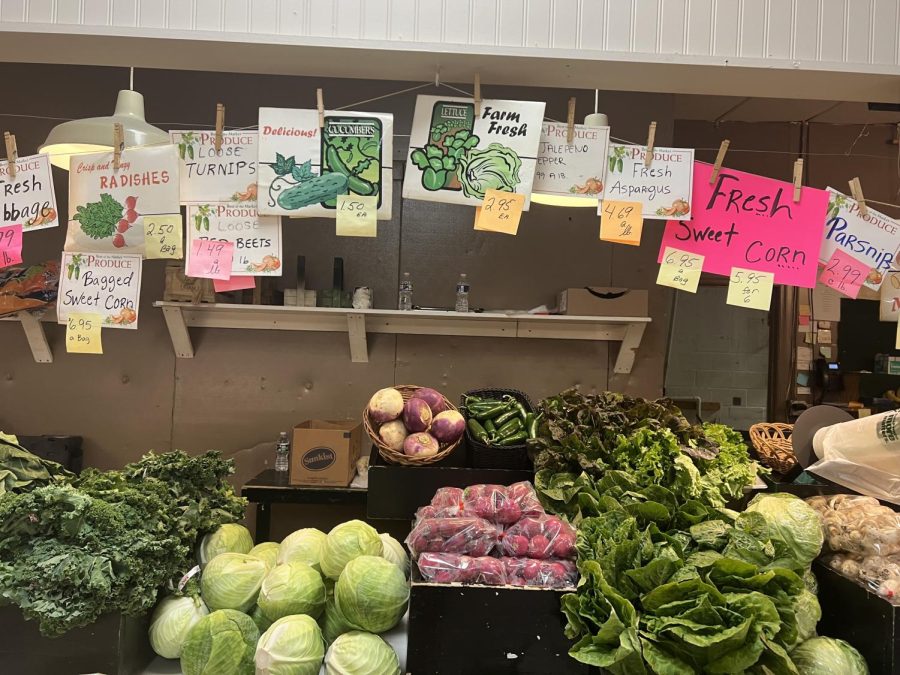‘We work outside, love nature and work for God’: an inside look at the Germantown Dutch Market
Every Thursday, Friday and Saturday, Amish Dutch families make the journey from their homes in Lancaster, Pennsylvania, to the Lancaster County Dutch market in Germantown, Maryland.
October 3, 2022
This story was published in print during the 2021-22 school year.
In preparation for the Saturday morning customer rush, shopkeeper Kate dips ripe apples into a deep bowl of golden caramel, and then carefully rolls them in chopped nuts or M&Ms, coating their sticky exteriors. After setting the candied apples aside on a piece of parchment paper, she admires the perfectly organized cases of fudge and chocolate-covered strawberries — some of the most in-demand items at Lapp’s Candies. Lapp’s is one of many family-owned shops at this one-of-a-kind market, where several other vendors — including King’s Barbeque, Beiler’s Doughnuts, Zook’s Cheese and Esh Produce — all crank out fresh food for eager customers visiting the shopping center on Wisteria Drive. Besides their tasty products, these shops all have something in common: They’re owned by Amish Dutch families.
Every Thursday, Friday and Saturday, these families make the journey from their homes in Lancaster, Pennsylvania, to the Lancaster County Dutch market in Germantown, Maryland. A group of Amish businessmen established the market in 1996, with the goal of bringing farm-fresh goods and a unique community’s culture to the Maryland area.
Despite their seclusion from modern society, the Amish Dutch have found success in markets due to outsiders’ curiosity about their unconventional lifestyle. They’re easy to spot in a crowd: Amish women traditionally wear ankle-length, solid-colored dresses, white aprons and “kapps,” or bonnet-like head coverings, while men dress in button-down shirts, broadfall trousers and suspenders. Since the Amish religion prohibits them from operating motorized vehicles, they travel by horse-drawn buggies. These restrictions might seem outlandish to strangers, but for the Amish, they’re simply routine.
Like many other immigrant communities, the Amish originally fled Europe to escape religious persecution. As German and Swiss Mennonites — a Protestant sect of Christianity — these families migrated to Pennsylvania in the early 1700s. Almost 300 years later, the Mennonites, now widely known as the Amish, continue to stand by their strict and distinctive religious beliefs. Amish generally live in close-knit societies that value community, modesty and simplicity.
“We try to keep it reserved, we don’t have electricity in our homes and we own small businesses in the community,” Kate said. “We work outside, love nature and work for God.”
At home, the day-to-day lives of the Amish Dutch are starkly different from those of the rest of the general American public, even in terms of the language they speak.
“We speak Pennsylvania Dutch, derived from the German language,” Kate said. “We have German in our churches, but we speak English for society.”
The first Amish market in the U.S., the Lancaster Central Market, emerged alongside the establishment of Lancaster County, Pennsylvania in 1730. Ever since then, family-owned, generations-old Amish businesses have continued to set up shop. Market staples often include farm-sourced dairy products, baked goods straight from the oven and hand carved wooden furniture crafted by highly-skilled carpenters — a common profession for Amish Dutch men.
To commute to the Germantown market three days a week, the families hire drivers to transport them and their multitude of goods. With ingredients including sacks of flour and fresh meats from Lancaster, vendors arrive early in the morning to prepare freshly-squeezed orange juice, thick-crusted pies and trays of fudge.
Regular customer Jimmy Williams, who visits the Dutch Market every Friday to pick up banana pudding, chicken wings and ribs, believes that the level of freshness is the market’s distinguishing factor.
“Everything is made from scratch, and being from the South, I appreciate when things are homemade,” he said. “Their food is the best I’ve had since my grandma’s.”
The fudges at Lapp’s Candies, featuring flavors ranging from maple walnut and peanut butter swirl to English toffee, are made with a large, silver fudge kettle. After combining a dry mix of sugar and chocolate with butter and flavoring in the kettle, fudge-making specialists Anna-May and Fannie-Ruth continually stir each batch as they heat up. Often mixing flavors together, they pour two batches into a tray lined with parchment paper, creating swirling designs on the surface of the fudge before it sets.
“It’s just a matter of mixing everything together,” Kate said. “Once the fudge is heated, they can mix different trays, and they’re pretty detailed.”
When she’s not at the market, Kate works as a horseback riding instructor, specializing in equestrian therapy for children with special needs. She became familiar with Lapp’s Candies after instructing the children in the Lapp family.
“After I got to know their children, I heard about their business and started working here, and I really enjoy it,” Kate said.
Zook’s Cheese, another popular shop at the market, sells goods from multiple independent, Amish dairy companies. Their cases display glass bottles of milk, tubs of homemade ice cream and an assortment of cheeses.
“We’re the middle man,” Zook’s employee Nancy Fisher said. “We represent a lot of different Amish companies, like the smoked cheeses and butters that come from the Amish in Ohio and Pennsylvania. There’s at least 30 Amish-owned businesses that we supply.”
Samuel Esh founded Esh Produce in the early 1970s, initially selling eggs before expanding to meats and produce. In the market, the Esh Produce stand supplies fruits and vegetables ranging from lettuce and radishes to berries and melons, most of which are grown seasonally on the Amish farms. Esh Produce also caters to companies such as Zook’s.
“Esh Produce is where we buy our eggs from,” Fisher said. “They raise their chickens on different farms up in Lancaster.”
Fisher began working at Zook’s after getting married at the age of 24. The idea of a hands-on job without the requirement of past experience in the industry excited her, she said. Seeing the job opening as a unique opportunity, she and her husband embraced the idea of working at the Dutch Market.
“I just love the interaction with the customers,” Fisher said. “So I guess the reason I’m here is because I love people and I love cheese.”
The level of education in Amish Dutch communities has evolved throughout Fisher’s childhood. After the Supreme Court ruling of Wisconsin v. Yoder in 1972, schooling for Amish children became mandatory only until eighth grade — so the year Fisher turned 14, she stopped attending.
“I went to public school for six years and then an Amish Parochial school for two years and I loved both schools, but they’ve taken the Bible out of public schools since I went,” Fisher said. “Today, we have Parochial, one-room schools where our children learn about Jesus, and they learn the German language, which is what our ministers preach in.”
The close-knit community found in Amish-teaching schools translates to the market’s environment. There, businesses often run in the family; Nancy Fisher’s son, Lester Fisher, runs Beiler’s Doughnuts, another shop within the market. Lester’s father had owned the bakery for the previous 16 years, and, despite drifting from the family business during adolescence, Lester felt honored to be the successive owner, he said.
“The people here are awesome, and they’re what brought me back here after being a teenager,” Lester said. “It hasn’t really changed over the years. It’s always been a family environment.”
Most items are baked in-house, but occasional breads and cakes are supplied by local Amish-owned bakeries in Lancaster, he said. After spending most of his childhood by his father’s side at the market, Fisher learned the ways of the family business.
“I started working here when I was around ten or eleven years old, and when the market was first here, it took a lot of effort to establish what we were about,” Lester said. “My father was a huge part of the effort in making this place successful.”
With over 30 flavors and a wide selection of both doughnuts and pies, Beiler’s Doughnuts made a name for themselves in Pennsylvania, the location of their first shop, before reaching Germantown. The business prides themselves on finding natural ingredients, baking with fresh fruit — “never canned,” as Lester said — and abstaining from the use of preservatives. It’s an ethos reflective of the Amish market as a whole, where all businesses emphasize both quality products and quality community.
“We have to make a living, but the customers are really what keep us here,” Lester said. “What I love about working here is the loyalty of the customers, and the relationships between the people here.”










